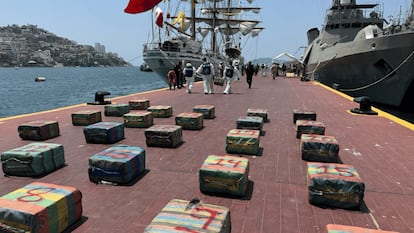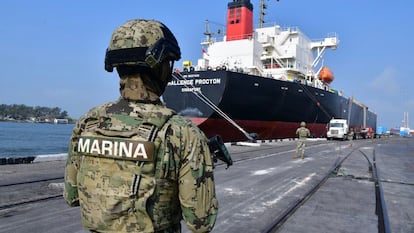Cocaine and contraband fuel: Mexican navy secures historic seizures
In just 10 days, the navy, supported by other institutions, has seized thousands of kilos of drugs and millions of liters of gasoline from criminal organizations


On March 31, the Mexican government reported the seizure of 10 million liters of diesel stored on “the land of a freight company” in the city of Altamira, Tamaulipas, in the northeast of the country. This was part of a multi-site operation carried out at two locations in the city and in the neighboring port of Tampico, where authorities impounded a ship. This is the second massive seizure of contraband fuel in just a few days, following the confiscation of another eight million liters of diesel last week in Ensenada, Baja California.
With these blows, Claudia Sheinbaum’s security cabinet is flexing its muscles, particularly the navy, which in recent weeks has also carried out two major operations against drug trafficking networks operating in the country. This weekend, a boat was intercepted near Acapulco, Guerrero, carrying 1.8 tons of cocaine. A month ago, the navy similarly intercepted a boat off the coast of Oaxaca carrying 1.9 tons of the drug. In the six months of Sheinbaum’s administration, authorities have seized nearly 30 tons of cocaine at sea.
All of these actions have occurred around U.S. Secretary of Homeland Security Kristi Noem’s visit to Mexico, the first by a senior official in Donald Trump’s administration. Noem met with Sheinbaum at the National Palace last Friday, days before the tariffs on automotive products were due to go into effect on April 2. Among other things, the two ratified a “memorandum of understanding” between the customs agencies of both countries, an agreement that aims, among other things, to improve cooperation against smuggling. The vessel intercepted Monday, related to the fuel seizure, had set sail from Texas.

The recent seizures represent a blow to the criminal groups dedicated to stealing fuel, a practice known as huachicol, directly from Pemex pipelines or smuggled from the United States. Given the scale and locations where the seizures have been recorded, it appears to be the latter modality: smuggling from the U.S., also known as fiscal huachicol. The mafias, allied with customs personnel, smuggle fuel into Mexico undeclared, aiming to avoid taxes, a practice that, according to the National Organization of Petroleum Exporters, amounts to around 1 billion pesos (around $49 million) daily.
Reports of fiscal fuel theft along the northern border, especially in Tamaulipas, have been ongoing for some time, and extend beyond the changing of the guard at customs, now in the hands of the army and navy, between late 2020 and early 2021. The operations of recent days, especially Monday’s, led by the navy, seek to change perceptions on this matter, in a context of constant negotiations with the U.S. government on security and migration issues, as evidenced by Noem’s visit, or the various trips of Mexican security czar Omar García Harfuch north of the Rio Grande.
These two operations go beyond the seizure of fuel, as they appeared to also dismantle part of the logistical structure of the criminal networks behind it. In Monday’s operation, authorities seized the aforementioned vessel, as well as “192 containers, 23 tractor-trailers, various firearms, and ammunition,” according to a statement from the Secretariat of Security and Citizen Protection. In the Ensenada operation, authorities seized 100 container-type boxes, 46 tanker trailers, 19 tractor-trailers of various models, and 12 motor pumps.
The security cabinet’s work on this matter puts the spotlight on the customs agency, headed by a civilian, Rafael Marín Mollinedo, but operated by the military. Businesspeople in the industry who have denounced corruption at the agency in recent years, such as Julio Almanza, president of the Tamaulipas State Federation of Chambers of Commerce, have been murdered. Almanza, who worked in Matamoros, had always criticized the agency’s corruption, which has always been linked to fuel theft, and he was killed in July last year.
Sign up for our weekly newsletter to get more English-language news coverage from EL PAÍS USA Edition
Tu suscripción se está usando en otro dispositivo
¿Quieres añadir otro usuario a tu suscripción?
Si continúas leyendo en este dispositivo, no se podrá leer en el otro.
FlechaTu suscripción se está usando en otro dispositivo y solo puedes acceder a EL PAÍS desde un dispositivo a la vez.
Si quieres compartir tu cuenta, cambia tu suscripción a la modalidad Premium, así podrás añadir otro usuario. Cada uno accederá con su propia cuenta de email, lo que os permitirá personalizar vuestra experiencia en EL PAÍS.
¿Tienes una suscripción de empresa? Accede aquí para contratar más cuentas.
En el caso de no saber quién está usando tu cuenta, te recomendamos cambiar tu contraseña aquí.
Si decides continuar compartiendo tu cuenta, este mensaje se mostrará en tu dispositivo y en el de la otra persona que está usando tu cuenta de forma indefinida, afectando a tu experiencia de lectura. Puedes consultar aquí los términos y condiciones de la suscripción digital.








































